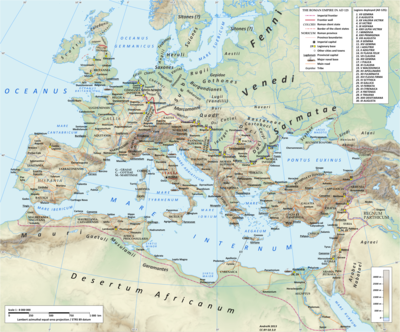Cherusci
The Cherusci were a Germanic tribe that inhabited parts of the plains and forests of northwestern Germania in the area of the Weser River and present-day Hanover during the first centuries BC and AD.
After rebel Cherusci killed Arminius in AD 21, infighting among the royal family led to the highly Romanized line of his brother Flavus coming to power.
Following their defeat by the Chatti around AD 88, the Cherusci do not appear in further accounts of the German tribes, apparently being absorbed into the late classical groups such as the Saxons, Thuringians, Franks, Bavarians, and Allemanni.
[8] As part of his German campaigns, Drusus marched an army east into the territory of the Cherusci in 11 BC and was ambushed as he returned west at a narrow pass called Arbalo, probably near modern Hameln or Hildesheim.
Finally, in AD 4, Tiberius overcame the factions of the Cherusci still hostile to Rome and by the next year he considered the tribe a Roman ally, giving it special privileges.
The elder son Arminius returned as an auxiliary commander under P. Quictilius Varus, who began organizing Germany as the new province of Germania Magna in AD 7.
A Cheruscan noble named Segestes attempted to warn the governor repeatedly, but Varus ignored him and followed Arminius into an ambush in the Teutoburg Forest and marshes in AD 9.
In AD 14, Germanicus raided the Chatti and Marsi with 12,000 legionnaires, 26 cohorts of auxiliaries, and eight cavalry squadrons and systematically laid waste to an area 50 miles wide such that "no sex, no age found pity".
[15][16] Arminius assembled the Cherusci and surrounding tribes while Germanicus marched some men east from the Rhine and sailed others from the North Sea up the Ems, attacking the Bructeri on their way.
Tacitus reports the Battle of the Weser River as a decisive Roman victory:[21][22] The enemy were slaughtered from the fifth hour of daylight to nightfall, and for ten miles the ground was littered with corpses and weapons.
A mound was raised with an inscription reading "The army of Tiberius Caesar, after thoroughly conquering the tribes between the Rhine and the Elbe, has dedicated this monument to Mars, Jupiter, and Augustus.
In AD 47, the Cherusci asked Rome to send Italicus, the son of Flavus and nephew of Arminius, to become their chieftain, as civil war had destroyed their other nobility.
Where the strong hand decides, moderation and justice are terms applied only to the more powerful; and so the Cherusci, ever reputed good and just, are now called cowards and fools, while in the case of the victorious Chatti success has been identified with prudence.




